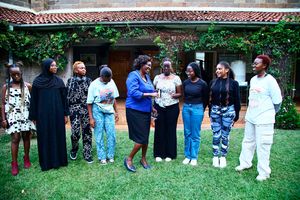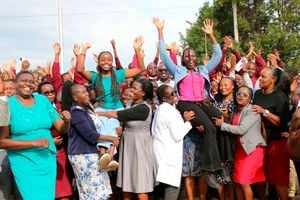Trailblazers in tech: How Kenyan women are closing the gender gap in Stem

Betty Mwende, a Bachelor of Applied Computer Technology student at USIU-A; Caren Jeruto, an IT graduate; and Sumaiyya Juma, a security consultant at Cyber Ranges, during the interviews at Nation Centre, Nairobi, on November 15, 2024.
What you need to know:
- Against the odds, the three young women have been rewriting the rules for women in technology.
- Through their inspiring journeys, they are revolutionising technology and using it to fight GBV that contributes immensely to gender inequality.
At the age of 10 when Betty Mwende was admitted to Kenyatta National Hospital for nine months, she thought her education had ended. The physical disability that affected her whole nervous system made it impossible for her to walk or move, resulting in her dropping out of school.
“I was in the intensive care unit for three months and after some time I started recovering. I used to have intense physiotherapy and I have been able to navigate from a wheelchair user to crutches. Now I can walk on my own,” she recounts her recovery journey.
The Meru County-born and bred student then went back to school and committed to nothing but excellence in her academic work, despite her financial challenges. She then applied for scholarships and got one to join the United States International University-Africa, where she is currently a third-year student pursuing a Bachelor of Applied Computer Technology.
Her choice, of course, was inspired by her passion for computers. Growing up as a young girl, she used to be a spectator of her male cousins playing video games. She kept her hopes alive. Her first chance to use such an electronic device came after she applied for and won a scholarship from Google. This opportunity has opened her mind and made her believe that she has all it takes to study computer science.
“When I joined campus, I was not as confident as I am right now because as a person with a disability, I doubted whether that was really my thing and wondered how people would perceive me. I had so many doubts but the university is inclusive and that helped me, “she says of her initial fears.
Her choice has since been full of opportunities, thanks to her growing network of technology gurus who mentor her. In December last year, she joined the African Girls Can Code Initiative through UN Women, and went through a two-week boot camp. She was introduced to web development, cybersecurity, robotics, programming, data analysis, and machine learning that offered her a different exposure outside her routine classes.
Betty, who reveals to have received a laptop and a router during the boot camp training, decided to take the same skills she gained to a school in her village. She imparts digital literacy such as Microsoft Word, Excel, and web development to young learners during her school holidays. She uses three computers, a router, and a printer she bought and donated to one of the schools where she conducts training.
“I saw a gap when it comes to our rural schools, especially in my community, where they are marginalised, having been brought up in a setup where a computer is unheard of. Most of us interact with it probably when you go to a good high school or when you are in university or college,” she says.
By furthering her studies in IT and networking with like-minded people in her field, which is still male-dominated, Betty says faces imposter syndrome and hopes to overcome it gradually as she continues to challenge herself by taking competitive roles that offer her the opportunity to speak at international conferences.
Caren Jeruto, who graduated with a Degree in IT in September, admits that fewer young girls pursue IT courses. According to the University of Embu alumna, this gender gap makes female students in the field less confident. “In our class, we were less than 10 girls, while the rest of the students were men and that made me not have enough confidence to showcase myself or do a better project,” Caren says.
She says having fewer women pursuing IT courses means their male counterparts are more technology-savvy and that increases women’s vulnerability to being victims of online threats. As a result, she came up with the Bila Uoga project, a Swahili phrase for without fear, to help women seek help when they are in danger.
“I came up with this project because I wanted to save other girls. In Kenya, we are in that crisis of hearing a girl is dead, someone is being abducted somewhere, so maybe I can save one or two people and that will be an achievement.”
Caren wants to be a gender-based violence activist and says that her Bila Uoga project is a safety application that works by prompting a user to enter their name, and the phone number of someone to whom they want to send the alert message. She says that once the user presses, enter, the device automatically captures the location, which then goes as a link to the receiver with the message reading, “I am in trouble.”
She hopes that if this application is implemented, femicide cases will reduce as many girls will be saved in time before the perpetrators destroy their lives. She recently presented the Bila Uoga application when she got the UN Women scholarship to represent the African Girls Can Code Initiative Kenya at the Pan-African forum in Algeria. She got the opportunity because of her background in technology when she was a third-year student.
“While I was in school, I was not as confident and that makes me believe that when a girl is empowered, she will know her rights, and she will be confident enough to know what she is capable of,” Caren says.
Betty and Caren are alumnae of the African Girls Can Code Initiative, a collaboration between UN Women, the African Union Commission, Siemens, and the International Telecommunications Union.
Sumaiyya Juma, another alumna, says her commitment to completing the full curriculum qualified her for a scholarship from the Siemens EmpowerHER programme. She was trained in cybersecurity, undergoing an extensive six-month syllabus. She was paired with a mentor who guided her and two months later, because of her background in technology, she got her current job as a security consultant through UN Women.
“Thirty of us completed the curriculum and interviews were conducted for the 30 of us but only six of us got the opportunity to go to Germany and represent African Tech Talent on the global stage,” Sumaiyya says.
The Machakos-born woman has been in technology from high school, having done computer studies from Form One to Form Four. After passing her Kenya Certificate of Secondary Education exam, she joined the university and took a Diploma in IT course. Her entry into the job market began during her attachment at the Judiciary where she gained industry experience.
“I was also part of the team implementing the digitisation of court documents when the Judiciary turned from physical courts to digital during the Covid-19 period. I was part of the people who implemented the e-filing at the Judiciary in Milimani Law Courts.”
The UN Women says that existing initiatives that equip young girls in technology show that the future of African women in science, technology, engineering, and mathematics (Stem) looks brighter. For over five years since its launch, the African Girls Can Code Initiative has had three cohorts.
Sumaiyya, who was in cohort one and two others, is currently conducting an online cybersecurity and data protection training to a team of 30 young women from the three cohorts. She says it is their way of sharing the knowledge they have acquired in cybersecurity, being beneficiaries of a highly sought-after certification in cybersecurity scholarship.
“For you to protect yourself, online starts with your mobile phone. Knowing the security features of your phone is important, from the mobile application to the security setting, and the application settings. So, we train in how to secure mobile updates,” she says.
Such digital security skills are important as they protect those knowledgeable from technology-facilitated GBV that happens online. As she continues to climb her career ladder, Sumaiyya says women in technology are being discriminated against because they are women.
“Getting into these spaces, you speaking up as a woman is not easy. Sometimes you go and your juniors ask you to get them coffee because, according to them, you are the coffee girl. Sometimes you go into these spaces and the people just look at you like you are just there to share your story and listen, instead of speaking and working,” the young trailblazer says.
Now in her 20s, Sumaiyya knows that her journey in technology is not going to be easy and she is determined to excel in the space as evidenced by her academic and career qualifications.
“We experience a lot of discrimination and if you do not speak for yourself and let your voice be heard the right way, you are going to either end up quitting or be in a depression, as they say, women belong in the kitchen,” Sumaiyya concludes.




